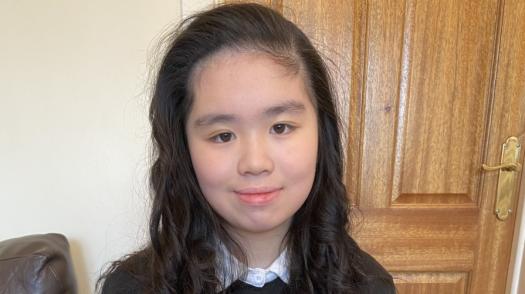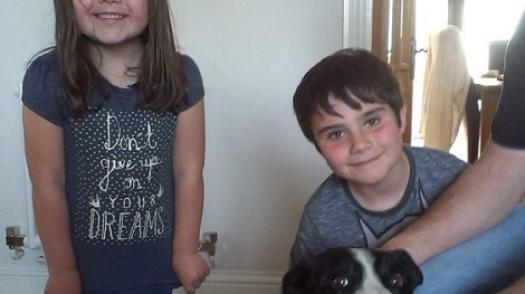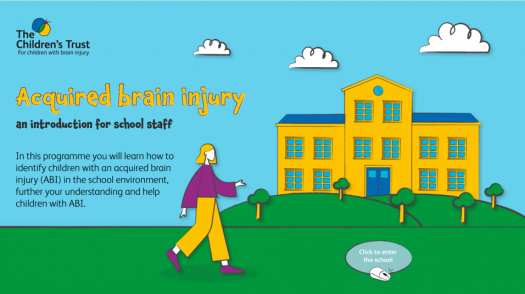
Abscess (subdural empyema): Joey
Joey, 16, tells us about her brain injury at the age of 12, determination to recover and how her ‘second chance’ has led her to inspire others.
In her first vlog for the Brain Injury Hub, 16-year-old Joey talks recovery and motivation after a brain injury at the age of 12.
Joey has shared her personal experience of recovery after a subdural empyema and abscess of the brain. Watch the video – or read the transcript below.
Please do contact us with any questions you have for Joey – or suggestions for her next Brain Injury Hub blog!
Hello everybody. My name is Joey. I am 16 years old. I’m in lower sixth right now in Northern Ireland in a grammar school. And I am a survivor of an acquired brain injury in 2018.
Today I’m going to answer some questions that some people might be wondering. This is really good for people who are also trying to recover because that’s always the right path to choose. So here we go…
At first, I did feel helpless I admit, and I thought I’d never be the same again, but this wasn’t fully true. It’s true that I am a different person today, but that doesn’t mean that I don’t love who I am right now.
Recovery’s not an easy path to take. It was difficult at the beginning, but motivation was my key – the most important things in life will push you to strive for more – and I’m a living example of that. I would either get better, or I could let my illness take over, and trust me, I never admit defeat.
Honestly, I was devastated at the idea that I was going to have to take time off to recover. I hate taking time off school! But I knew that it would be worth it. At that point I would have done whatever it took to be the girl I was, or someone who I could embrace.
I was in tears for days and days, but tears turned to cries of joy when I learnt how to move my left hand again.
Every little moment of recovery brought about a moment of happiness. I embraced every single change, and recovery wouldn’t feel like such a long process once my mindset had changed.
I had an amazing team of doctors, nurses, surgeons, therapists, family and friends – and even teachers from my school and the hospital who assisted me throughout every single step of the way.
Doctors and surgeons are the reason I am still living and breathing. They performed operation after operation, diagnosed me before it was too late, and for that, I’m forever in their debt. And I still feel like I’m in their debt.
I was afraid of all the nurses and staff at the beginning, but soon, the faces of strangers became the faces of my soon-to-be family. I truly believe that they are the reason as to why I kept smiling through it all, and to this day, I still remember their names.
Every therapist who has ever helped me, physically and mentally, has contributed an immeasurable amount – from getting me back on my feet, to helping me understand who I was.
My parents, and my brother, who stuck by my side every moment. I had so much love that I was numbed with emotions from them – crying for me, praying for me, and being my motivators.
I had a friend group of about five girls, maybe six, who were are my greatest friends, even today in sixth form. We would text once I regained movement, they would even visit me once I got better – and they were shocked at the sight of me – I was no longer ‘that girl’ anymore. But they were the most considerate, trustworthy and caring friends.
There were teachers in the hospital who continued to help me with my education, to make sure I could fit in once I was back to school.
Teachers from my school would send me cards and gifts, praising me for my bravery and wishing me a speedy recovery. It wasn’t the gifts that made the difference, it was the idea that I meant something, especially to my form teacher and my year head. Against all odds, they believed in me when I didn’t even believe in myself.
I suffered from subdural empyema and abscess of the brain – which also left me paralysed on my left side (also known as hemiparesis), and my vocal cords closed up as well, which I think is vocal cord palsy.
But when you grow up as a healthy child, like me, you take for granted the things which we do not think about, such as walking, eating, talking. I lost all of these in an instant – becoming motionless, lifeless and speechless.
The most difficult hurdle though, was the mental one. I was so uncertain whether I would ever recover – but all I needed was to find a piece of myself again.
Not at all! I’ve changed, you’ll never be the same person again – but this was the best thing that ever happened to me!
Change is necessary. I’ve changed for the better. I was obsessed with recovering and returning to the same girl who was well and healthy, but this is impossible in every single way!
You cannot go back and change the beginning, but you can start where you are and change the ending – which is what I changed my mindset to.
I came out weak and vulnerable, but I was a new me. I was not going to adjust to society instantly, but by the time I went back to school and socialising, I was happy again – appreciating what was given back to me – my life and my personality.
Today, still recovering, I’m a girl who can speak in class, who enjoys interaction with others, although still incredibly shy! I’m able to go out with my friends – and I can follow my dreams – to sing, play piano and be who I am.
Things do not always seem like they are looking up, because you feel so far down. However, you can climb your way up – and reach your destination!
Let people pull you an inch every now and then. It’s okay to struggle, it’s okay to feel like the world is weighing you down, but you can do it! I believe in you, just like everyone believed in me!
And this is key to your recovery. It doesn’t matter if you feel like you are weak and vulnerable because those are the emotions that will make you strong and fierce when you come out as a different person.
Thank you so much for listening and if you have any questions please feel free to email me via thehub@thechildrenstrust.org.uk I have really enjoyed doing this blog for you!

Joey, 16, tells us about her brain injury at the age of 12, determination to recover and how her ‘second chance’ has led her to inspire others.

At age seven Rhodri was misdiagnosed as ‘not’ having an ear infection; the infection went on to cause a brain abscess on the temporal lobe. Mum Clare shares their experience.

Free fast-track training session for primary school teachers